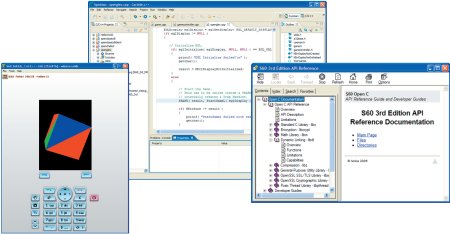Nokia smartphones become more “Linux-like”
Apr 4, 2007 — by LinuxDevices Staff — from the LinuxDevices Archive — 1 views Nokia has taken a significant step toward making its most popular smartphone software platform appeal more to corporate and third-party application developers. Working with Symbian Ltd., Nokia has integrated “Linux-like” support for normal C applications into its Symbian-based S60 smartphone… software stack.
Nokia has taken a significant step toward making its most popular smartphone software platform appeal more to corporate and third-party application developers. Working with Symbian Ltd., Nokia has integrated “Linux-like” support for normal C applications into its Symbian-based S60 smartphone… software stack.
Previously, developing third-party applications for S60 phones required using the proprietary “Symbian C++” language. Now, Nokia and Symbian have produced “Open C” libraries for the S60 platform that are said to provide a “Linux-like, vendor-neutral C-programming interface to core functions on S60 devices,” while offering performance “comparable to that of native Symbian C++ applications.”
Support for Open C applications will be built into Nokia's S60 Third Edition, Feature Pack 2 stack. Additionally, Nokia said it will produce “SIS” (Symbian Installation System) packages so that devices based on S60 Third Edition and S60 Third Edition, Feature Pack 1 can be upgraded with Open C capabilities.
Additionally, Nokia is immediately offering a freely downloadable “Open C Plug-In extension” for its S60 3rd Edition SDK (software development kit). The extension gives developers use of “familiar, standard C function libraries,” so that open source and desktop applications can be migrated to the S60 more easily, Nokia said.

Nokia's S60 emulator, “Open C” extension, and documentation screenshots
(Click to enlarge)
Intriguingly, applications specifically mentioned include Apache and Firefox. Nokia has in the past toyed with the notion of webserver-enabled mobile phones.
The newly ported Open C libraries include:
- The libz compression library
- libcrypt and libcrypto from the OpenSSL project
- libglib, a C library containing routines for trees, hashes, lists, and strings, and used by projects that include GTK+, GIMP, and GNOME.
- libssl, C libraries needed by programs such as apache-ssl and openssl
Nokia earlier this year ported four C-language POSIX libraries to S60 from FreeBSD, including:
- libc, standard libraries such as the standard math library that are used by nearly all C programs
- libdl, for loading DLLs (dynamically linked libraries)
- libpthread, implements IEEE Std 1003.1c (POSIX) standard interface for multiple threads of execution within a traditional user process
- libm math library
As Nokia moves to make S60 more Linux-like, some analysts question how long it may take before Nokia simply adopts Linux. Last September, research firm ARCchart said Nokia's ultimate adoption of Linux for its S60 phones was a matter of “not whether… but when.” Similarly, ABI Research Director Stuart Carlaw stated earlier this week, “Linux in the cellular phone is not a question of 'if,' but 'when.'”
Adam Leach, principal analyst with Ovum, stated, “Open C will allow S60 and third party developers to port, with greater ease, a whole range of open source software. Open C will also help S60 licensees address the issue of time-to-market by making porting of existing software assets developed in C for non-Symbian phone projects over to S60 much easier.”
Lee Epting, VP of Nokia's global developer program, stated, “Nokia is helping to greatly broaden the potential pool of developers. Because Open C libraries are built on open-source projects, developers who need to design and implement large application bases to run on several operating systems, will now find it easier to write portable code for Symbian OS based devices.”
Nokia said it has sold 80 million phones that run the S60 smartphone stack. Of 49 models that run the stack, 20 can run S60 Third Edition. Of those, Open C has been tested on the 3250, E60, E61, E70, N71, N73, N80, and N91, Nokia said.
Availability
More details about S60 Open C extensions, including the SDK extension download, can be found here.
This article was originally published on LinuxDevices.com and has been donated to the open source community by QuinStreet Inc. Please visit LinuxToday.com for up-to-date news and articles about Linux and open source.